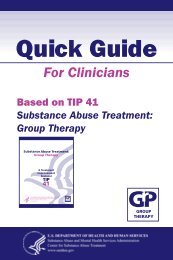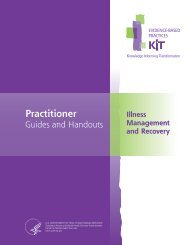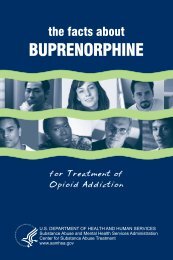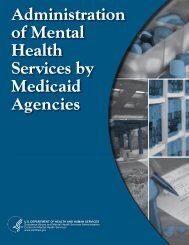TAP 21 - SAMHSA Store - Substance Abuse and Mental Health ...
TAP 21 - SAMHSA Store - Substance Abuse and Mental Health ...
TAP 21 - SAMHSA Store - Substance Abuse and Mental Health ...
Create successful ePaper yourself
Turn your PDF publications into a flip-book with our unique Google optimized e-Paper software.
Addiction Counseling Competencies<br />
Recovery – achieving <strong>and</strong> sustaining a state of health in which the individual no longer engages<br />
in problem behavior or psychoactive substance use <strong>and</strong> is able to establish a lifestyle that<br />
embraces health <strong>and</strong> positive goals.<br />
Regression – a mechanism whereby an individual retreats to the use of early-life or less mature<br />
responses in attempting to cope with stress, fears, pain, or memories.<br />
Relapse – the return to a pattern of substance abuse or the process during which indicators<br />
appear before the client’s resumption of substance use.<br />
Relapse prevention – a variety of interventions designed to teach people with substance use<br />
disorders to cope more effectively <strong>and</strong> to overcome the stressors/triggers in their environments<br />
that may lead them back into drug use <strong>and</strong> dependence. The interventions can be placed in five<br />
categories: assessment procedures, insight/awareness raising techniques, coping skills training,<br />
cognitive strategies, <strong>and</strong> lifestyle modification.<br />
Reliability – the degree to which a measure is consistent.<br />
Resilience – the ability of an individual to cope with or overcome the negative effects of risk<br />
factors or to “bounce back” from a problem. This capability develops <strong>and</strong> changes over time,<br />
is enhanced by protective factors, <strong>and</strong> contributes to the maintenance or enhancement of health.<br />
Risk factors – conditions for a group, individual, or identified geographic area that increase the<br />
likelihood of a substance use problem or substance abuse.<br />
Screening – gathering <strong>and</strong> sorting of information used to determine whether an individual has<br />
a problem with substance use <strong>and</strong>, if so, whether a detailed clinical assessment is appropriate.<br />
Selective preventive interventions – activities targeted to individuals or a subgroup of the<br />
population whose risk of developing a disorder is significantly higher than average.<br />
Self-determination – the extent to which individuals control their lives.<br />
Self-help group – a supportive, educational, usually change-oriented mutual-help group that<br />
addresses a single life problem or condition shared by all members.<br />
Service coordination – the process of prioritizing, managing, <strong>and</strong> implementing activities in an<br />
individual’s treatment plan.<br />
Significant others – family member, sexual partner, <strong>and</strong> others on whom an individual is<br />
dependent for meeting all or part of his or her needs.<br />
Sobriety – the quality or condition of abstinence from psychoactive substance abuse supported<br />
by personal responsibility in recovery.<br />
Special populations – diverse groups of individuals sharing a particular characteristic,<br />
circumstance, or problem.<br />
Spirituality – a belief system that acknowledges <strong>and</strong> appreciates the influence in one’s life of a<br />
higher power or state of being.<br />
Stage of change – transtheoretical description of one of several stages through which a person<br />
passes in moving from active use to treatment <strong>and</strong> abstinence.<br />
Stage of readiness – the individual’s awareness of need to change. Can be influenced by<br />
external pressure (family, legal system, or employer) or internal pressure (physical health<br />
concerns).<br />
174







